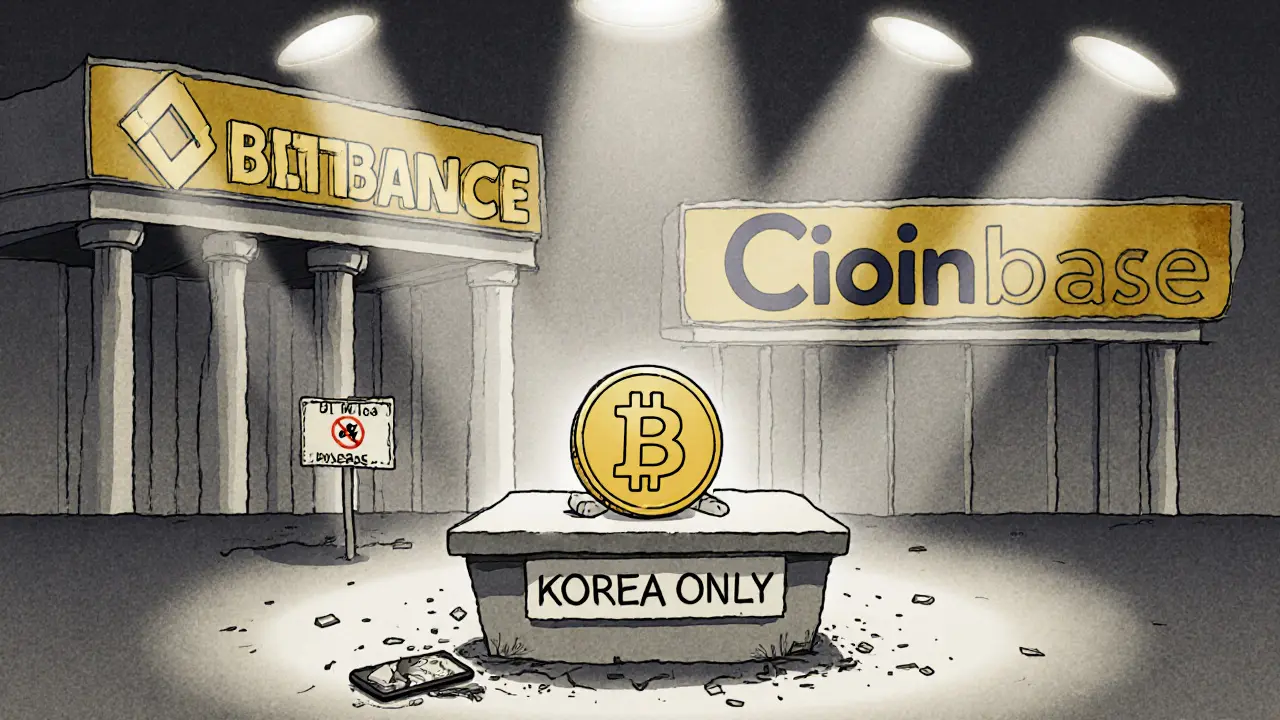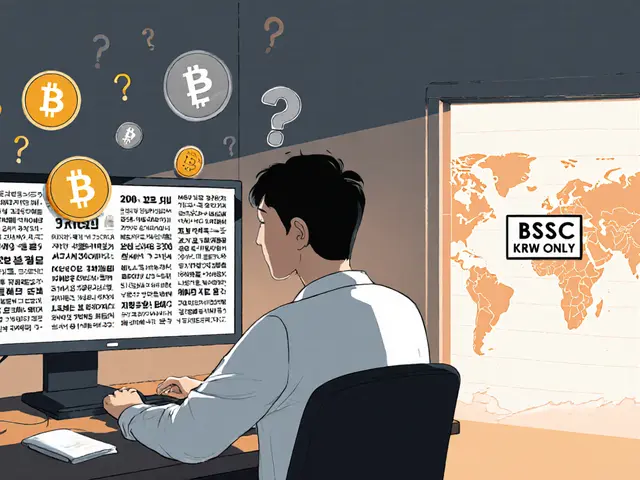If you're looking to trade cryptocurrencies in South Korea, you might have come across Bitsonic. But if you don’t speak Korean, or you're outside the country, you're probably wondering: Is this exchange worth your time? The short answer is - it’s not for most international users. Bitsonic is a crypto exchange built for Koreans, by Koreans, and it shows in every part of its design.
Bitsonic Is a Korean-Only Exchange
The biggest hurdle for anyone not living in South Korea is the language. Bitsonic’s entire platform - from login to trading charts to customer support - is in Korean. There are no English, Spanish, or even Chinese options. No toggle. No language switch. No hidden setting. If you don’t read Korean, you’re locked out. This isn’t a design flaw - it’s intentional. Bitsonic targets South Korea’s domestic market, where over 20% of adults own some form of cryptocurrency, according to Chainalysis 2023 data. The exchange doesn’t need to go global because the local market is big enough. But that also means if you’re not fluent in Korean, you’ll need to rely on Google Translate or a friend just to place a simple buy order. That’s not just inconvenient - it’s risky.What You Can Trade on Bitsonic
Bitsonic supports a solid selection of major cryptocurrencies. You can trade BTC, ETH, EOS, and USDT. But the real standout is its native token: Bitsonic Coin (BSC). Don’t confuse this with Binance’s BSC (Binance Smart Chain). Bitsonic Coin is a completely different asset, issued only by this exchange. It’s used for fee discounts, staking rewards, and sometimes as a bonus for trading volume. Trading pairs are mostly KRW-based. That means you can deposit Korean Won directly and buy crypto without needing to convert USD or EUR first. This is a huge advantage for locals - no need to go through third-party gateways or pay extra conversion fees. But for international users, this means you’d have to first get KRW, which isn’t easy without a Korean bank account. Unlike Binance or Bitunix, Bitsonic doesn’t offer futures, leverage trading, or margin trading. There’s no 10x, 50x, or 125x leverage. No perpetual contracts. No advanced order types like stop-limit or trailing stops. If you’re looking for high-risk, high-reward trading, this isn’t the place. Bitsonic feels more like a simple, no-frills spot exchange - similar to early 2017 Coinbase, but only for Korean speakers.No International Licensing, No Transparency
Here’s something you won’t find anywhere on Bitsonic’s website: information about regulation. No mention of FINTRAC, FinCEN, or any other global licensing body. No Proof of Reserves reports. No audit summaries. No public wallet addresses to verify holdings. In South Korea, exchanges are required to register with the Financial Services Commission (FSC) and follow strict KYC and AML rules. Bitsonic likely complies locally - but there’s no public proof. That’s not unusual for smaller domestic exchanges, but it’s a red flag if you’re used to platforms like Kraken or Coinbase, which publish detailed compliance reports. Compare that to Bitunix, which openly lists its licenses in the US, Canada, and the Philippines. Or Binance, which has published multiple third-party audits. Bitsonic gives you nothing. If security and transparency matter to you, this exchange doesn’t meet basic standards.
No Mobile App, No Support, No Help
You won’t find a Bitsonic app on the Apple App Store or Google Play. There’s no official mobile website optimized for phones. The platform is desktop-only. That’s a problem in a country like South Korea, where over 90% of people use smartphones for daily transactions. If you’re on the go, you’re out of luck. Customer support? There’s no live chat. No email address listed publicly. No help center. No FAQ page in English. If you run into an issue - say, a failed deposit or a stuck withdrawal - you’re on your own. No phone number. No ticket system. No community forum. This isn’t just poor service - it’s a lack of infrastructure.Who Is Bitsonic Actually For?
Let’s be clear: Bitsonic is not for global traders. It’s not for beginners. It’s not for people who want to compare prices across exchanges. It’s not even for non-Korean speakers who live in Korea. It’s only for one group: South Korean citizens who speak fluent Korean, have a local bank account, and want a simple way to buy and sell crypto with KRW. If you fit that profile, Bitsonic might work for you. It’s one of many local exchanges - alongside Upbit, Bithumb, Coinone, and Korbit - that dominate the Korean market. For everyone else? Save yourself the frustration. Use a global exchange like Binance, Kraken, or Coinbase. They support dozens of languages, have mobile apps, offer customer support in multiple time zones, and publish security audits. You’ll pay slightly higher fees, but you’ll get real reliability.
Why Bitsonic Won’t Grow Beyond Korea
The crypto world is moving fast. Exchanges that want to survive need to scale globally. That means multi-language support, mobile apps, international KYC, and compliance with multiple regulators. Bitsonic does none of this. It doesn’t even try. No announcements about expanding. No press releases. No social media presence outside Korea. No partnerships with international payment providers. No advertising outside Seoul. It’s a local business stuck in a local bubble. Compare that to Bitunix, which launched in 2022 and already operates in over 15 countries with multi-jurisdictional licenses. Or Binance, which serves users in 190+ countries. Bitsonic isn’t just behind - it’s invisible to the global market.The Bottom Line
Bitsonic is a functional exchange - if you’re Korean. It offers clean trading, direct KRW deposits, and its own token. But for everyone else, it’s a dead end. No app. No English. No support. No transparency. No future. If you’re outside South Korea, skip it. If you’re in Korea but don’t speak Korean, use a translator app - but know you’re flying blind. If you’re looking for a safe, reliable, globally accessible crypto exchange, there are far better options. Bitsonic isn’t bad. It’s just not for you.Is Bitsonic a safe crypto exchange?
Bitsonic likely follows South Korea’s local regulations, which require KYC and AML checks. But there’s no public proof of security audits, Proof of Reserves, or regulatory licensing. Unlike global exchanges like Binance or Kraken, Bitsonic doesn’t publish any transparency reports. If you care about verifiable security, this exchange falls short.
Can I use Bitsonic if I don’t speak Korean?
Technically, yes - if you use a translation tool like Google Translate. But the interface isn’t designed for translation. Buttons, error messages, and help texts often don’t translate correctly, which can lead to mistakes when trading. Many users report confusion with deposit addresses and withdrawal limits. It’s possible, but not recommended.
Does Bitsonic have a mobile app?
No. Bitsonic has no official mobile app on iOS or Android. The website isn’t optimized for mobile either. You’ll need to use a desktop or laptop to trade. This is unusual in South Korea, where nearly all crypto trading happens on phones.
What is Bitsonic Coin (BSC)?
Bitsonic Coin (BSC) is the native token of the Bitsonic exchange. It’s not related to Binance Smart Chain. BSC is used for fee discounts, staking rewards, and sometimes as a bonus for high-volume traders. You can trade it on the exchange, but it’s not listed on major global platforms like Binance or Coinbase.
Can I deposit USD or EUR on Bitsonic?
No. Bitsonic only accepts Korean Won (KRW) for fiat deposits. You can’t deposit USD, EUR, CAD, or any other currency directly. To use the exchange, you need a South Korean bank account and KRW. This makes it inaccessible to international users without local banking access.
How does Bitsonic compare to Upbit or Bithumb?
Upbit and Bithumb are larger Korean exchanges with English interfaces, mobile apps, and more trading pairs. They also have higher trading volumes and better customer support. Bitsonic is smaller, less known, and lacks most of these features. Unless you specifically want to trade Bitsonic Coin (BSC), there’s little reason to choose it over Upbit or Bithumb.
Is Bitsonic regulated?
Bitsonic likely operates under South Korea’s Financial Services Commission (FSC) rules, as all major Korean exchanges must. But unlike Upbit or Coinone, Bitsonic doesn’t publicly disclose its regulatory status or provide audit reports. Without official confirmation, you can’t verify its compliance.
Does Bitsonic offer leverage or futures trading?
No. Bitsonic only supports spot trading. You can buy and sell crypto directly with KRW or other cryptocurrencies. There are no margin accounts, no leverage, no futures contracts, and no advanced order types. It’s a basic exchange designed for simple trading, not speculation.

Suhail Kashmiri
Why do people even bother with these local exchanges? If you can't even translate the interface, you're asking for trouble. This isn't crypto-it's a language barrier with wallets attached. I've seen people lose money because Google Translate turned 'withdraw' into 'deposit.' Don't be that guy.
Kristin LeGard
Of course it's for Koreans. America built the internet, and we built the crypto revolution. This little Korean bubble is cute, but it's not scalable. If you're not building for the global market, you're just building a museum piece. And museums don't pay dividends.
Arthur Coddington
It's funny how we treat crypto like it's supposed to be decentralized, but then we get mad when an exchange decides to be… local? Bitsonic isn't broken-it's a mirror. It reflects the fact that most people don't actually want freedom. They want convenience. And convenience is often a walled garden with Korean signage.
Phil Bradley
I used to think global exchanges were the only way, but then I met a guy in Seoul who traded on Bitsonic every morning with his coffee. He didn't need English. He didn't need leverage. He just wanted to buy BTC with his salary and sleep easy. Maybe the real flaw isn't Bitsonic-it's our obsession with complexity. Sometimes simple is better. Even if it's in another language.
Stephanie Platis
Let’s be clear: Bitsonic is not ‘unsafe’-it’s just untransparent. And transparency is not optional in finance; it’s mandatory. The absence of Proof of Reserves, audit reports, or regulatory disclosures is not a ‘local nuance’-it’s a red flag, period. If you’re not publishing your financial integrity, you’re not a trustworthy exchange-you’re a black box with a website.
Michelle Elizabeth
It’s like finding a vintage vinyl record in a world of Spotify. Bitsonic doesn’t care about your convenience. It doesn’t want your dollars. It just wants to exist-quietly, beautifully, in its own lane. And honestly? That’s kind of noble. We’ve turned crypto into a casino. Bitsonic is the last quiet library where people still trade because they believe in the tech-not the ticker.
Joy Whitenburg
no mobile app?? really?? in 2024?? 😅 i mean, i get it, korea is wild with phones, but if you're not on mobile, you're basically saying 'i don't trust anyone to use me on the go'... which is kinda the opposite of crypto's whole vibe, right? also, i tried translating their site once and it told me my withdrawal was 'a gift from the blockchain gods'... i just closed it and walked away.
Kylie Stavinoha
There’s a deeper cultural question here: Is decentralization truly decentralized if it requires fluency in a single language to participate? Bitsonic, while exclusionary, is a product of a society that values localized trust over global accessibility. Perhaps the real innovation isn’t in the tech-it’s in the social contract. We assume crypto must be global, but what if the future is a mosaic of regional hubs, each speaking their own truth?
Diana Dodu
Let’s not pretend this is just about language. This is a gateway for money laundering under the guise of ‘local culture.’ No audits? No international compliance? No mobile app? This isn’t a crypto exchange-it’s a tax shelter with a trading interface. And don’t tell me ‘it’s legal in Korea’-if it can’t prove it’s not being used for illicit activity, it’s complicit. The FSC doesn’t mean squat if they’re not publishing anything.
Raymond Day
BITSONIC IS A SCAM. 😈 I’ve seen the screenshots. People deposit KRW, get a ‘successful’ confirmation, then their funds vanish into a wallet that doesn’t exist. No support? No email? That’s not incompetence-that’s design. They want you to lose money quietly. And then they use your ‘lost’ funds to pump BSC. Don’t be fooled. This isn’t a platform-it’s a Ponzi with a Korean flag.
Noriko Yashiro
Actually, I think Bitsonic is a beautiful example of cultural authenticity in tech. Why should every platform be built for the lowest common denominator? There’s value in serving a community deeply, even if it’s small. The fact that it’s not trying to be Binance is… refreshing. We’re all chasing scale, but maybe the real winners will be the ones who stayed true to their roots.
Atheeth Akash
Some people just want to buy crypto without the noise. Bitsonic is like a quiet temple in a busy city. No drama, no leverage, no ads. Just KRW to BTC. If you can't speak Korean, maybe it's not for you. That's okay. Not every door needs to be opened.
James Ragin
Think about this: Why does Bitsonic refuse international KYC? Why is there no public ledger? Why no mobile app? The answer isn’t ‘local focus’-it’s evasion. They’re avoiding FATF reporting. They’re avoiding AML flags. They’re hiding from the U.S. Treasury. And if you think this is just ‘cultural difference,’ you’re ignoring the fact that every major crypto scandal in Asia started with a ‘local-only’ exchange that refused transparency. This isn’t tradition-it’s a trap.
Michael Brooks
I’ve used Bitsonic. It’s clunky, but it works. If you’re Korean, it’s the most straightforward exchange in the country. No confusing UI, no fake ‘deFi yield’ scams, no 100 trading pairs you don’t understand. Just buy BTC with your salary, hold it, sell it when you need cash. That’s it. Global exchanges are great for speculators. Bitsonic is for people who just want to own crypto without getting sucked into the circus.
Also, BSC isn’t useless-it’s a utility token. You get 30% off fees. That’s real value. Stop acting like every token needs to be on Coinbase to matter.
David Billesbach
They’re not just ignoring the global market-they’re actively sabotaging it. Bitsonic Coin is a pump-and-dump vehicle disguised as a utility token. The lack of liquidity, the absence of external listings, the silence on audits-it’s all part of the plan. They want you to buy BSC, lock it in, and never look back. Meanwhile, the insiders are dumping on the dark pools. And the Koreans? They’re too busy translating ‘withdrawal’ to notice the money’s gone. This isn’t a platform. It’s a controlled environment. And you’re the lab rat.